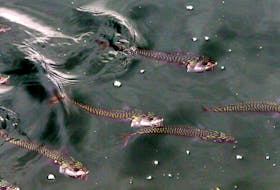The future of the Northern Pulp mill in Pictou County and the hundreds of jobs it supports are in jeopardy in the wake of the provincial Environment Department's announcement Tuesday that it requires more information from the company on its proposed effluent treatment facility.
The decision announced by Environment Minister Gordon Wilson on Dec. 17 found the focus report submitted nearly three months ago by the Abercrombie Point mill was inadequate and asked the mill to provide more science-based information to determine how the project will affect fish, fish habitat, air quality, water quality and human health.
"Under the environmental assessment regulations, I have three options," Wilson said. "I can approve this effluent treatment plant, with or without conditions, I could reject it or I could require that the proponent file an environmental assessment report. While there has been some good work done here, I've concluded that I need more science-based evidence, more information before me to properly assess the potential risk to air, water, fish and human health. As a result, I've decided that Northern Pulp must file an environmental assessment report if they want to continue with this project."

Brian Baarda, chief executive officer of Paper Excellence Canada, Northern Pulp's parent company, said in a statement that the company is disappointed in the government's decision and that an extension on the Boat Harbour Act is required to keep the mill running.
"An environmental assessment and the continued operations of Northern Pulp require an extenstion to the Boat Harbour Act," Baarda said. "Until we have a decision on the extension of Boat Harbour Act, the future of Northern Pulp and Nova Scotia's forestry sector remain in jeopardy. We ask that the government of Nova Scotia provide a decision on the Boat Harbour Act as soon as possible to ease the sense of unknown amongst the thousands of families who are anxiously awaiting a decision on their future in Nova Scotia."
The existing government-owned Boat Harbour effluent treatment plant that has been in operation since the mill opened in 1967 is legislated to close on Jan. 31, 2020, predicated on an agreement reached between the provincial Liberal government and Pictou Landing First Nation more than five years ago.
Premier to talk Wednesday
Premier Stephen McNeil has repeatedly said he has no intention of reopening the 2015 Boat Harbour Act to allow the existing treatment facility to stay in operation beyond January. The mill estimates a timeline of at least 18 months to construct a new treatment plant and pipeline, protracted by the Environment Department decision Tuesday.
Wilson said any decision concerning the Boat Harbour Act is beyond the purview of his department. The premier has scheduled a news conference for Wednesday morning to discuss the Northern Pulp issue.
The minister said he did not make the decision lightly.
"I am aware of the implications this could have on people's lives and livelihoods but I have said from Day 1 that this decision will be based on science and best available information."
Watch replay of Environment Minister Gordon Wilson's news conference
The department will post draft terms of reference online by Jan. 10 and the public and government reviewers will have 30 days to comment. The mill has up to two years to submit its environmental assessment report.
Company reviewing its options
Baarda said the company is reviewing the decision and its options.
"We have been following the federally and provincially agreed process to obtain the necessary approvals to construct our proposed wastewater treatment facility and ensure the long-term sustainability of thousands of jobs in Nova Scotia's forestry sector," Baarda said.
The mill's focus report stated that effluent to be treated at the plant proposed for construction on mill property will be piped to an outfall four kilometres from shore at Caribou, achieving better dilution than is the case with the effluent that is currently discharged from the Boat Harbour facility. The 245-page focus report claimed that the 85 million litres of treated effluent being discharged daily into the Northumberland Strait would not harm marine species in the vicinity.
In its focus report, the mill adjusted its 15-kilometre pipe route to the far edge of the Highway 106 right-of-way and rerouted it to run underwater across Pictou Harbour rather than being attached to the Pictou Causeway.
Ecojustice and Friends of the Northumberland Strait (FONS) expressed relief with the minister's decision.
"Northern Pulp has twice produced unreliable and inaccurate documents, although they had five years to gather information," Jill Graham-Scanlan, president of the Friends group said in a statement. "We believe the minister had enough evidence to reject the proposal now, but we are ready to present him with the science a third time. We believe that a full environmental assessment report will prove that Northern Pulp's proposal would cause significant harm. At the end of the day, we are confident that this project will be rejected and there will be no pipe in the Northumberland Strait."
James Gunvaldsen Klaassen, a lawyer with Ecojustice who made a submission on behalf of FONS that included expert opinions pointing to significant project risks, said the process to request additional information will provide for continued involvement from the public and independent scientific experts.
"We hope for a fairer process this time around, with more more time for the public to read materials and provide input," Gunvaldsen Klaassen said.
Town wants 'no risk' solution
Wilson said the effluent treatment system design poses some problems and said the company should consult further with the Town of Pictou about its concerns.
Pictou Mayor Jim Ryan said he is happy that concerns about the pipeline going through his town’s watershed have been recognized, but he said he’s also worried that the problem has just been pushed down the road by the minister's decision.
“Our position was pretty specific — no risk,” Ryan said. “What does no risk look like? It means, ‘don’t put it through there, really. That’s what no risk means to me.”
He said in some ways he was disappointed that nothing conclusive was decided in Tuesday's announcement.
An emotional Andrea Paul, chief of the Pictou Landing First Nation, said she had expected the minister to grant conditional approval of the focus report.
"That's what we've been asking from the beginning, to make sure that the science they're providing isn't going to have any harm on our resources, our fish, our land and our air," Paul said.
In March, then-environment minister Margaret Miller responded to the mill’s original environmental assessment by ordering a focus report to address concerns about potential impacts of the project on fish and fish habitat, facility design, water resources, air quality, noise, human health and Mi'kmaq land uses.
Complicating the issue is that submissions from five federal government departments were among the 3,254 public comments on the focus report forwarded to the provincial Environment Department. The federal departments, including Environment Canada and Fisheries and Oceans, criticized the focus report for lacking necessary information and noted that the 36-day public comment period that ended Nov. 18 was not long enough.
Jonathan Wilkinson, the federal environment minister, announced Monday that he will not order a longer federal assessment of the proposed treatment facility.
Fishermen’s associations from all three Maritime provinces, Pictou Landing First Nation, tourism operators, cottagers, boaters and outdoor enthusiasts oppose the Northern Pulp plan to dump treated effluent in the Northumberland Strait.
Northern Pulp manufactures 280,000 tonnes of Kraft pulp annually, primarily for export to manufacture household products such as tissue, toilet paper, writing and copy paper.
The mill is an important economic driver that generates more than $200 million annually into the Nova Scotia economy. The mill has more than 200 employees and indirectly creates a significant number of well-paying jobs in typically high-unemployment and rural areas through its connections with private woodlot owners, forestry contractors and local sawmills.
Jerry Diaz, president of Unifor, the union that represents mill workers, said it is "absolutely outrageous" that government asks Northern Pulp for study after study.
"The timing is horrendous because what it has done is really put a huge cloud over 2,700 direct workers over the Christmas period," Diaz said. "The frustrating part about all of this is that we know that the current effluent that is going into the water is not toxic. It’s been proven time and time again by some of the more leading pros in the industry. We are sitting here with a solution that we can touch but nobody is moving forward. We have a company that is looking to invest significantly in a water treatment centre that will create nothing but long-term job security in this province."
RELATED:
- No risk is acceptable, says Pictou mayor after province's decision on Northern Pulp treatment plan
- Northern Pulp says mill's future at risk after province's decision
- Ottawa won't do in-depth assessment of Northern Pulp effluent treatment plan
- Northern Pulp decision imminent
- BACKGROUND: Expected Northern Pulp, Boat Harbour decisions come after years of controversy
- TIMELINE: A post-colonial history of Boat Harbour
- Expected Northern Pulp decision churns up worries on the water
- Looming Northern Pulp decision could chip away at forestry business








